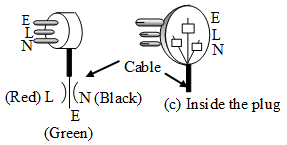What is the Purpose of an Electrical Earth
Earthing
Definition : Connecting the metallic body of a high powered electrical appliance (e.g. electric iron, refrigerator, oven, etc.) to the earth wire of domestic circuit, is called ‘earthing’.

In three pin plug, has three pins forming a triangle. The upper pin is thicker than the two lower pins. (fig.) The pins are connected inside the body of the plug to the three different coloured wires of a three–cored, wire cable [Fig.]. The colour code of the wires is green (Earth–E), Red (Live–L), Black or Brown (Neutral–N).
Benefits : Due to wear and tear with long use, the live wire inside the appliance becomes bare (uncovered) and touches the body of the applicance. This contact raises the potential of the body to the huge potential of the live wire. If we operate that appliance with bare foot, we will be getting a severe shock.
If the appliance is earthed, its body potential remains zero due to contact with the earth. Nothing is felt when such an appliance is operated.
We may conclude that we save ourselves from severe electric shocks, by earthing our electrical appliances.
Over–Loading and Short–Circuiting
The current exceeds the limit under two situations.
- over–loading
- short–circuiting
They are discussed ahead.
Over–Loading : When high powered electric appliances like refrigerator, airconditioner and electric iron are switched on simultaneously, total current through main wire may exceed the tolerance limit causing damage and fire. This situation causes over–loading.
Short–Circuiting : Due to long use wear and tear or defective insulating material, the live and the neutral wires may become bare at some points and come in direct contact. Due to zero resistance, a large current is produced and a huge sparking is caused at the point of contact. It may cause damages and fire. This situation is called short–circuiting.
Electric Fuse
Introduction : It is a small, simple and cheap but very useful electric appliance used in domestic electric circuits.
Working : Whenever there is sudden voltage rise in mains or “over–loading” or short–circuiting’ in domestic electric circuits, the current becomes very large and exceeds current tolerance of the electric appliance, the fuse becomes hot and melts to break the circuit. The appliance is saved from the damage to be caused by the large current.
